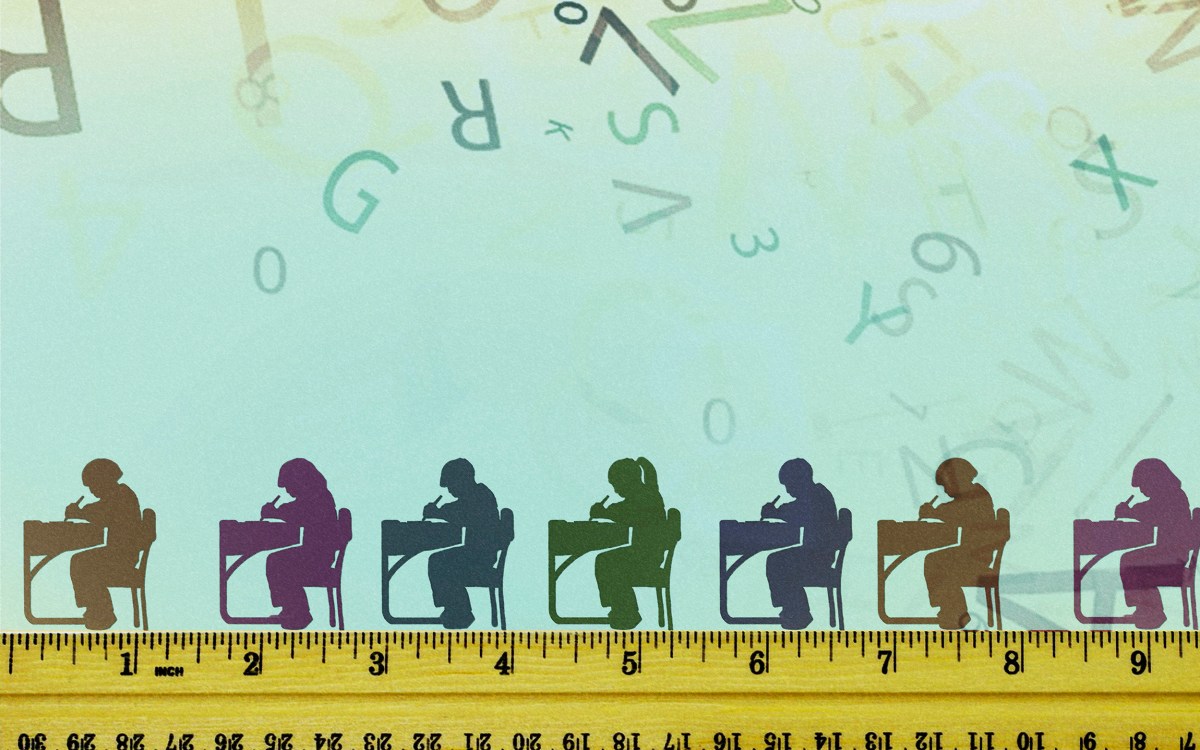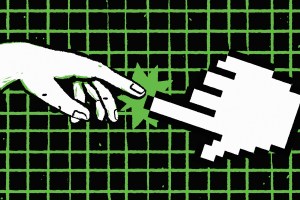
‘Harvard Thinking’: Our democracy problem
Three scholars on how a ‘big, heterogeneous, diverse country’ can avoid coming apart
As the 2024 presidential election kicks into gear, U.S. democracy is again facing scrutiny. Probably for good reason.
“There are a lot of indicators to suggest that our democracy is not at the healthiest point a democracy can be,” said Danielle Allen, the James Bryant Conant University Professor and director of the Allen Lab for Democracy Renovation at Harvard Kennedy School’s Ash Center for Democratic Governance and Innovation. She pointed to a few of those indicators: young people seem less committed to democracy than past generations; general trust in institutions is in decline; and polarization is getting worse.
Even so, says the legal scholar Stephen Sachs, it’s important to remember that the U.S. has experienced rough patches before and navigated them. The task before leaders and citizens is defining (and addressing) the specific nature of our current challenges.
“We’ve had roughly the same constitutional structure for a very long time, but now it seems to be doing less well in particular, unique ways,” said Sachs, the Law School’s Antonin Scalia Professor of Law. “I think that’s really what we need to figure out.”
Steven Levitsky, a professor of government and the co-author of “How Democracies Die” and “Tyranny of the Minority,” said that some of these modern challenges should prompt a serious look at constitutional reform. We need to examine where other democracies have found success and urge lawmakers to open their minds to change, he said.
“Our constitution is arguably the most successful national constitution in the history of the world,” Levitsky said. “We [also] have, among democracies, quite far and away the hardest constitution in the world to amend. That handicaps us.”
In this episode, host Samantha Laine Perfas speaks with Allen, Levitsky, and Sachs on how citizens and leaders can reenergize and protect U.S. democracy.
Transcript
Stephen Sachs: I honestly think that a very great number of the changes that have made American democracy seem to be performing less well are really not constitutional in origin. We’ve had roughly the same constitutional structure for a very long time, but now it seems to be doing less well in particular, unique ways.
Samantha Laine Perfas: U.S. democracy has seen better days. In recent years, the country has experienced enormous stress in the face of intense polarization and a crisis of trust. What will it take for citizens and leaders to reignite our democratic spirit?
This is “Harvard Thinking,” a podcast where the life of the mind meets everyday life.
Today, I’m joined by:
Danielle Allen: Danielle Allen. I’m the James Bryant Conant University Professor. I am a political philosopher and scholar of public policy.
Laine Perfas: She’s a democracy advocate and also runs the organization Partners in Democracy, which works on democracy renovation. Our second guest:
Steve Levitsky: Steve Levitsky. I am the David Rockefeller Professor of Latin American Studies and professor of government at Harvard.
Laine Perfas: He’s also the co-author of the best-sellers “How Democracies Die” and “Tyranny of the Minority.” And finally:
Sachs: Stephen Sachs. I’m the Antonin Scalia Professor of Law at Harvard Law School.
Laine Perfas: He teaches and writes about constitutional law, as well as how U.S. democratic structures have changed and remained the same throughout history.
And I’m Samantha Laine Perfas, your host and a writer for the Harvard Gazette. In today’s episode, we’ll discuss the past, present, and uncertain future of democracy in the United States.
Right off the bat, I want to get a sense from each of you: Do you think U.S. democracy is fragile right now? Why or why not?
Allen: Well, yes, I think it is fragile at the moment. One can point to any number of indicators. For me, one of the most important ones is the disconnection of younger people to our democracy.
Younger people are much less likely to express a high degree of commitment to democracy than older people. There are indicators around general trust in our political institutions where there’s been massive decline, huge increases in polarization, and of course we are watching before our eyes, month to month, significant governance dysfunction play out in Congress.
So there are a lot of indicators to suggest that our democracy is not at the healthiest point a democracy can be.
Levitsky: A comparative perspective, there are now several organizations that measure levels of democracy in every country in the world each year. And, some are better than others, but they tend to converge and all of them show a decline in the level of U. S. democracy since 2016. Freedom House, for example, a decade ago, U.S. had a pretty decent score of 94. That put us on par with Canada and Japan and Germany and the U.K.; today [it] has us at 83, which is still a democracy, but it is tied with Panama and below Mongolia and Argentina, so that’s a step backward.
Sachs: So my sense is that many of our democratic institutions are still functioning in their ordinary way, but what has been happening is a problem outside those institutions. So are polarization, gridlock, inability to reach compromises, and those are things that are causing a great deal of dissatisfaction with our governing institutions.
But I don’t think that they have much made us in any way less democratic. It’s more that people are more willing to tolerate things that might be outside the democratic norm.
Laine Perfas: Could you talk about that a little bit more, Stephen?
Sachs: So it’s not that Congress has become a less-democratic institution. We still have elections. We still have regular turnover in office. We still have free speech. We still have all of the aspects that you would want.
I think the reason for the decline in identification with democracy and open support for democracy is in part because the democratic institutions are functioning less well than they could be and less well than expectations.
And I think that’s a result of a lot of different changes. Part of those are social changes that cause political polarization. Part of those are media changes that in the era of social media, it’s very easy to see where the government is failing. And some of those are legal changes that the party structure as a means of producing compromise is much weaker. You wouldn’t see something like the recent defenestration of the Speaker of the House if the parties were as strong as they have traditionally been in the American government. And that’s a problem because a lot of the places where compromises are hammered out and agreement is achieved is inside, you know, the smoke-filled room of the party bosses, and those smoke-filled rooms are doing a lot less work nowadays. So in some ways, perhaps paradoxically, it’s because the hidden institutions of democracy are working less well, and more is argued out in the open on a stage, that democracy itself is performing less well as a check on those in power.
Levitsky: I think the last point is right on, that in many respects our system has become more democratic, but that has challenged the way that democracy works.
We now have among the most internally democratic parties, but that has badly weakened party leaderships and has closed off a lot of that smoke-filled room, party-boss negotiations that Steve mentioned.
I do think that, I guess I have a slightly more holistic or broader view of institutional functioning perhaps than Professor Sachs. I do think some of our democratic institutions are functioning less democratically. For example, we have evidence from a recent biography of Mitt Romney, but I’ve had this confirmed to me by several congressmen and former congresspeople, that the decisions they are making are being influenced not just by voters or constituents or lobbyists or their calculations, but threats of violence. That they are making decisions or not making major decisions calculating the potential violence or threats of violence against them or their families. That suggests to me that we’re living in a polity that’s less democratic than it was a decade ago.
Allen: I want to appreciate Stephen for putting the question of parties on the table and Steve’s seconding their importance. It’s a paradox that we have a combination of weaker parties and parties that are more ideologically focused than in the past. So both parties were much bigger, broader tents. They had to do the work of forging coalitions inside themselves. That’s also because they saw their responsibility to be drawing membership from the American electorate broadly. It is not that long ago that 75 percent of Americans were members of parties. We’re down to 50 percent of Americans as members of parties. And when you put that number together with the effects of gerrymandering, which results in a lot of elections that are decided in the primary, not in the general election, you reach a point where a very small percentage of Americans is actually electing most of our members of Congress. So to take the examples of two of the most sort of lightning-rod figures in Congress from either side: Marjorie Taylor Greene is elected by 8 percent of the voters in her electorate, AOC [Alexandria Ocasio-Cortez] on the other side is elected by 5 percent of the voters in her electorate. And that is a direct outgrowth of how our party structure has evolved over time. So it includes unintended consequences of the reforms that made primaries state-funded, taxpayer-funded. They’re no longer the responsibility of the private association. As a result, parties can lose members, but they still get their primaries paid for.
And so you don’t have the kind of corrective mechanism in place that would help parties actually work to broaden their tents again and start to do that coalition-building work in meaningful ways. So there are a lot of interlocking pieces of our system. That’s one of the challenges of really understanding the dynamics of our contemporary democracy.
Laine Perfas: Have there been other times in history where we faced such challenges or is this just how democracy works?
Allen: My hunch would be that we’re all in agreement that the U. S. system is one of the most complex systems the world has ever seen. And that we have a degree of opacity that is actually pretty special and requires thought about how do we deal with it. That said, I mean, certainly democracies have always had complicated institutional structures, even in ancient Athens. If you try to read the instructions for how they selected people to be members of a jury, it can take literally a whole college semester to work your way through the manual explaining how those things worked because of the degree of complications. They tried to achieve accountability and randomness and transparency and all these other things, different values. And certainly in Britain, in the period 1760s and 1770s, where their system was under great strain, particularly with the colonial expansion and then the sort of problem of the American Revolution and the like. They were trying to find their ways to reform, but all the pieces were so intricately connected that you move one thing and something else falls apart, and they really struggled with that problem.
Sachs: Certainly democracy has always required ordinary people to make complicated decisions about complicated policies that they’re not experts on. And so one of the big virtues of democracy is that it prevents the system from going so haywire that even the ordinary person can tell that something has gone wrong here.
In the United States, there have been many periods where democracy seemed to be breaking down. Some of them are less sanguine for our current circumstances than others; the 1850s things seemed to be breaking down and indeed they were. I don’t think it’s quite like that today. There is definitely a greater sense, in an era of ease of disseminating information and ease of organizing, that the kinds of simple yes/no questions or Party A versus Party B questions that you could provide to the electorate now are much more complicated. And the ability of a relatively disengaged public to make good decisions in all of those circumstances is unclear.
So we have had periods of intense polarization before, but there are some things that are new. First of all, our political community is more diverse and more inclusive than any other period in history. That includes the electorate, but also the political elite. And secondly, thanks to the changes brought about in particular by access to the internet and social media, voters have so much more information than they had before, and for reasons I think we’re still beginning to come to grips with, are less trusting of political elites. So if you go back a couple of generations or a few generations, voters took their leads, for better or worse, from their party, from their local politician, from other figures, and didn’t do their own research, to use contemporary language. And today, for better or worse, we do not defer to our party leaders. We make our own decisions and that’s a big burden on citizens. It’s hard. I have a Ph.D. in political science. It’s hard for me.
Laine Perfas: One of the things we’re seeing now is this hyper-polarized environment that’s leading to gridlock politics. I’ve always found that to be really interesting because when you look at the views of most voters, a lot of people do find themselves to be pretty moderate. So what’s happening there? Why is it that it feels and is that we are so polarized when in fact it does seem that a lot of people are somewhere in that middle ground?
Levitsky: We’re obviously a very big, heterogeneous, diverse country, and one of the great moderating forces in our political system was that very diversity. We had considerable cross-cutting cleavages, which meant that you and I might agree on issues A, B, and C, but invariably we would disagree on issues D, E, and F. That might be foreign policy, abortion rights, healthcare, you name it. We would agree with our neighbor on some things, we would disagree with our neighbor on other things. And that meant that we had to get along with our neighbor. We would form our coalitions over certain issues: Professor Sachs and I would get together and be on one side of an issue, but the next day, I would have to get together with Danielle and line up with her. And so we had to be on reasonably good terms with different kinds of people. And that meant that no single cleavage defined us, and that no single political fight was all or nothing. And a very unexpected, I think, phenomena that has occurred over the last generation or two is that almost all of our social and political cleavages have aligned such that if you agree with me on issues A, B, and C, it is very likely that you’re going to agree with me on issues D, E, and F. And so, if you and I disagree on something, we’re likely to disagree on everything. Which means we have no history of collaboration, no likelihood of collaborating in the future, and a sense that if you win, you win on everything, which is creating an all-or-nothing sense to our politics.
Sachs: So what I would say is that even people who are moderates are not necessarily actually moderate. They may just be crazily radical in unpredicted directions. So someone who sometimes votes Republican because they hate immigration, but sometimes votes Democrat because they want massive unions, you know, that’s going to look on the charts like a moderate but in each direction there are sort of very, very pronounced political views. And so part of it is that now many people’s strong political views point in consistent directions with their fellows’. And I agree with Professor Levitsky about that. And then there are the two other changes are, first, the informational and news media change. There was a time when everybody in media could just agree, OK, we’re not reporting on that negative fact about John F. Kennedy. There’s just no way that would work today. And so in part, people’s trust in the system and in each other is shaken by facts about the system and in part by the fact that they now know the flaws of the system which were being deliberately hid from them in a cozier media age. And then finally I think you know a last factoring is that it’s just much easier to run an independent kind of candidacy without being beholden to other interests. So if you’re someone in the House of Representatives and you get your funding through a super PAC and not from the party and you want to raise money by going on Twitter or going on cable television and not by trying to have the Speaker of the House like you, it’s a lot easier to be essentially a totally independent actor. And then your incentives are to polarize as far as you can go, because that’s the sort of engaged person who will give you money because you’re going to tear the system down.
Allen: So I have a slightly different take, I think, than my two colleagues. When I was a kid, we used to spend summers in Santa Fe, and one of the things that my brother and I most enjoyed doing was playing with magnets that we could use to draw various magnetically attracted minerals out of the soil, out of the ground. It was just a fun game. And I think, honestly, that’s a little bit like what the situation is here. Different political dynamics can draw different results out of the American people. Our national political landscape draws very different results out of us than our state political landscape. When you look at the results from national elections, we are pitted against each other, 49-49, with a little bit of swing back and forth, and we look highly polarized. And that lineup does reflect the kind of pattern that Steve Levitsky was just describing, right? Where people are lined up on all dimensions on either side of a line. But if you look at state elections, and in particular ballot propositions, in exactly the same period of time, we frequently see the achievement of supermajority outcomes. That means outcomes where both Republicans and Democrats are voting for the same thing: felon re-enfranchisement in Florida in 2018; cannabis legalization all over the country; a new state flag in Mississippi to get rid of emblems of the old Confederacy. Some of the recent state-level reproductive freedom decisions as well have been either supermajority or near-supermajority outcomes. And you look at what those ballot propositions are about, they tend to be about fairness, inclusion, sticking up for people getting the short end of the stick in some fashion or other. As a people, there is a kind of recognizable moral compass that the American people has across partisan lines, and we do have the capacity to forge coalitions across those lines. I think the important point, though, is that our state political structures generate different incentives for political actors than our national political structures do. And the result of the two different incentive environments is you get like a highly polarized outcome in the one case and across ideological supermajority outcome in the other case. But to me that says, gosh, we’ve really got to step back from thinking that national polarized picture is an accurate snapshot of who the American people are, because different set of incentives, you get a different snapshot of who we the people are.
Laine Perfas: Thinking about the national level, one factor in that that I wanted to talk a little bit about is the Constitution, and if it is helping or hurting the current climate right now.
Levitsky: Our constitution is arguably the most successful national constitution in the history of the world. It’s the oldest written constitution. It is one of the critical foundations for prosperity and stability in the United States. So it’s very clearly part of the solution in a really fundamental way. I do think it is part of the problem, in certain targeted respects. Our constitution was written in a pre-democratic era and key elements of it were forged out of compromise at a time when our framers were worried about the union literally coming apart. And so they had to forge a set of consensuses and created some pretty interesting institutions, but we have changed those institutions relatively little since the 1780s. The difficulty of changing the U. S. Constitution, we have among democracies quite far and away the hardest constitution in the world to amend; that handicaps us.
Sachs: So my view is that the Constitution does relatively little with respect to our present predicament. I think that some institutions like the Electoral College or the Senate very much can create a situation where a minority of votes produces a majority outcome. I don’t think that our constitutional structures are the ones that have caused it. I think that it’s much more the many other parts of American life and American politics.
So let me, so one quick answer to your question, Sam, but then I’ve got a question for both Steve and Stephen. So constitutionalism helps us. Let’s start there. OK, let’s separate constitutionalism from the Constitution. Constitutionalism has made the durable existence of a free society of free and equal self-governing citizens possible. I think, as both have already said, what hurts is either other things that are accreting and causing us problematic dynamics, or parts of the Constitution that we haven’t been able to adapt that are no longer fit for purpose in contemporary circumstances. And so on that point, I think the single biggest and most interesting question, actually, is what we all think about the role of states in politics. Does a person think that we continue to be a union of states and need to recognize that every given state community is a distinctive community, and therefore one has to have a design that accounts for that? Or do we think that that is a thing of the past and that we are genuinely a single national people with soft borders and boundaries and so forth between our states? In which case you will have different answers to our current constitutional conundrum, depending on which view you have about the place of states in the lives of Americans.
Allen: I certainly do not think that the role of states is anywhere near what it was in 1787. This was a time when the former colonies thought of themselves as independent states, much, much closer to states in the European Union today. So the need, for example, to provide equal representation to each state in the U.S. Senate, because Delaware as a state needs protection from Virginia as a state, I think that’s a lot less compelling. Now that said, we are a very decentralized Republic. We should be a decentralized Republic. There should be a whole bunch of self-governing decisions taken at the local level and at the state level. So even though I, for example, am an advocate of a more proportional representation in the Senate so that larger states like Texas and California have greater representation than smaller states, I’m still an advocate of federalism.
Sachs: So I think the arrow of which direction over time is pretty clear, and I think that’s absolutely right. States are way less important today than they were 200 years ago. I don’t know that it means that they’re unimportant today. My former colleague Ernie Young has argued that in fact, state identity still does matter a lot. And one thing that I think is very interesting is that if we look at what’s happened since the Dobbs decision by the Supreme Court, look at how different states have reacted with regard to abortion policy; it’s been very state-by-state focused, in a world in which it’s very hard to imagine what the national consensus would be or if there is one. We’ve seen states go in very different directions and I think that it is important in some ways to reflect the fact that people have different preferences, because it’s not always easy to pick one answer that everyone will then have to live with.
Just anecdotally, I grew up in rural Minnesota on a farm. And now I live in Boston, Massachusetts, which is very different. It was a huge culture shock. But I think about the things that my community cared about, and how different that is now being in Massachusetts and being surrounded by different people. And how in some ways then when you bring it up to the national level, I can almost appreciate the impossible challenge of creating an overarching national identity.
Laine Perfas: I don’t know. And Danielle, I know it was your question, but I also want to hear your answer to your own question.
Allen: I appreciate your sharing that, Sam. And I asked the question because I have a bit of a more heterodox view on this point. I do think states still matter. I do think that as the story you just told illustrates, interests are meaningfully different from place to place and there is benefit to the elasticity that comes from recognizing that. So that has made me, for example, an advocate when it comes to the problem of the Electoral College, of not getting rid of it, not radically changing it, but of increasing the size of the House of Representatives as was the initial plan, so that the Electoral College is rebalanced and that you have a kind of reasonable weighting between populous and less-populous states as opposed to what we now have, which is a highly unreasonable weighting in the favor of less-populous states.
Levitsky: So I think it’s important not to conflate urban and rural identities with state identities. I mean, growing up on a farm in Minnesota is different from living in a city in Massachusetts. But it’s not super clear to me how dramatically different that is from growing up on a farm in Wisconsin, or even California for that matter.
Laine Perfas: Well, at least in my case, you know, if I think about the cultural identity of my state, one thing that I’ve even joked about is, what side of my now dual identity do I lean into: the Minnesota nice or the Masshole?
Levitsky: We all have both.
Laine Perfas: But, but it just creates this picture of like … it’s so hard to put into words, I don’t know if it’s values or just cultural identity, if you meet other Minnesotans, you, there’s something just about the way they are, but also if you meet other people in Massachusetts, whether they’re rural or urban, there’s this edge that you don’t always find when you go to a place like Minnesota.
Allen: Steve makes a good point though, in the sense that the urban/rural split was also split that matter at the founding, but it was balanced the other way around. That is to say the rural populations were more significant than the urban populations, but that was another feature underlying the compromise decisions, right? So it’s a good example of a place where demography is quite different now from at the founding. And so it raises the question of whether or not the institutional designs whose purpose was to achieve an equilibrium, despite the tensions flowing from those facts, do those designs still work given the fact that the demography has flipped on its head? And I think that’s honestly a very open question that we don’t have good answers to.
Levitsky: I just want to reinforce a point that Stephen made, which is that we have in the United States, despite the difficulty of amending the Constitution, we do have a tradition and moments in our history where we engaged in extremely important, either constitutional or quasi-constitutional reform, but it’s something we’ve stopped doing in the last half century. We’ve gotten out of the practice of thinking seriously about how to amend or improve our constitution, which is why, I’m not sure everyone in this room will agree with me, but I am in favor of making it somewhat easier to amend the Constitution. And I, for the reasons we were just talking about, would eliminate the process of going through three-quarters of the states and leave it up to two-thirds of two chambers of Congress for constitutional reform, which would put us a bit more in the mainstream of other democracies.
Sachs: So I, I have a crank proposal, not to change the threshold of constitutional proposal and ratification, but to flip the order to say that if three-fourths of the state legislatures want to agree on a proposal, they can send it to Congress for ratification by two-thirds of each house. I think it’ll be much easier to get the ball rolling in individual state legislatures than it is if you need the big bang of two-thirds of the House or two-thirds of the Senate to actually approve something.
Allen: I would put something else on table which is either/or; either two-thirds of Congress or three-quarters of the state, either one should be good enough for an amendment, from my point of view.
Sachs: Well, I think it would be, I think it would be very difficult to persuade either the two-thirds of the Congress that would need to propose this under the current system, or the three-fourths of the states that would need to ratify this, that they should allow amendments to go through without their having weighed in. Maybe that would be a better amendment system, but I don’t see the agreement there. Whereas if we just keep the threshold the same and allow either order, I think maybe we could get that one through. And maybe we could see from there, maybe things will seem more likely, once we’ve done it. But I honestly think that a very great number of the changes that have made American democracy seem to be performing less well are really not constitutional in origin. We’ve had roughly the same constitutional structure for a very long time, but now it seems to be doing less well in particular, unique ways, and ways that were different from the ways in which it was doing less well in other eras. And so I think that’s really what we need to figure out. Like, why is it that it seems that there are lots of policies that might get majority support in a plebiscite, but no compromise along those lines could possibly get through Congress. Why is that?
Levitsky: If I could just say very quickly, just because the problems facing our democracy are not constitutional in origin, and I agree with that, doesn’t necessarily mean that constitutional amendment or institutional reform can’t or shouldn’t be part of the solution.
Sachs: Fair enough.
Samantha Perfas: Whether it’s changing the constitution or some other reforms, what are things that we could do that would help address the current moment that we’re facing?
Allen: Abolish party primaries.
Sachs: Hear, hear.
Levitsky: I agree.
Allen: There are five states that have replaced party primaries with all comers, or nonpartisan preliminaries, as they’re called. So what that means is in a first round, you have all candidates from different parties running on the same ballot. Some number of finalists go on to the final round. But this means the politicians are responsible for campaigning to the whole electorate in both rounds. So you don’t have people just campaigning to the intense party base. It means once elected, they don’t have the same sort of fear of being primaried by a very small percentage of the electorate. So there looks to be real opportunity for more independence of decision-making, more room for compromise, if politicians don’t have to be afraid of being quote-unquote primaried in the current structure that we have.
Levitsky: Another, radically different way to go: Argentina has not only mandatory voting, it has mandatory primary voting. Everybody’s got to vote in a primary; choose your party, and you’ve got to vote. That would help to overcome one pretty serious problem that we have now, which is that our primary participation is relatively low. And so primary outcomes tend to be shaped by committed activist types, and that doesn’t always have a radicalizing outcome, but it often does. And it’s almost certainly contributing to our polarization.
Laine Perfas: Just to be clear, Danielle, you were proposing that we get rid of primary voting and Steve is proposing everybody has to do it?
Allen: Correct, I think either approach would solve our problem. I’ll tell you, though, I do think abolishing party primaries is the path that we’re on that has real feasibility to it.
Sachs: Just to add one more suggestion to the mix, I think something like ranked-choice voting or some other way of allowing people to indicate their second preference is crucially important. We see this in the Republican presidential primary right now, and in 2016 it would have been very different if we had a world where people had to talk about who their second and third preferences were, and you saw who was most broadly acceptable to the people in that party, in that state I think would make a very big difference.
I think it’s Jonathan Rauch who’s argued for a number of changes that would essentially diminish public input. And the idea is that the point of democracy is that you can throw the bums out. You can look around and say, “Wow, this is not working. We need something different,” and you can intervene in that way. It is not that members of the public take part in every level of the decision-making process before that point, because there’s lots of stuff that goes on in government that requires people in a closed off room to discuss things. One of the things I’ve found very interesting, people I’ve talked to who have been on various government commissions have found that the open-meetings laws make it incredibly difficult to actually have a real conversation about what should be done because everything is done on a stage. If I could make one change to Congress tomorrow, I would ban CSPAN. And the reason is not because I don’t want people to know what their government is doing, it’s that I want them to know what their government is doing, but I also want the government to be able to do it. I don’t want a world where you have to be a theater performer in order to hash out some kind of agreement in a committee room, and I think that a lot of the current political incentives favor show horses over workhorses. And I think that’s not an arrangement that we really want.
Allen: Thank you guys for joining me for such a great conversation.
Levitsky: Thanks for having us.
Laine Perfas: Thanks for listening for a transcript of this episode and to see all of our other episodes, visit harvard.edu/thinking. This episode was hosted and produced by me, Samantha Laine Perfas. It was edited by Ryan Mulcahy, Paul Makishima, and Simona Covel, with additional production support from Al Powell and Christy DeSmith. Original music and sound designed by Noel Flatt. Produced by Harvard University.
Recommended reading/listening:
- “How Democracies Die” and “Tyranny of the Minority” by Daniel Ziblatt and Steven Levitsky
- “Justice by Means of Democracy” and “Our Declaration: A Reading of the Declaration of Independence in Defense of Equality” by Danielle Allen
- “Amendments should start with states” by Stephen Sachs












